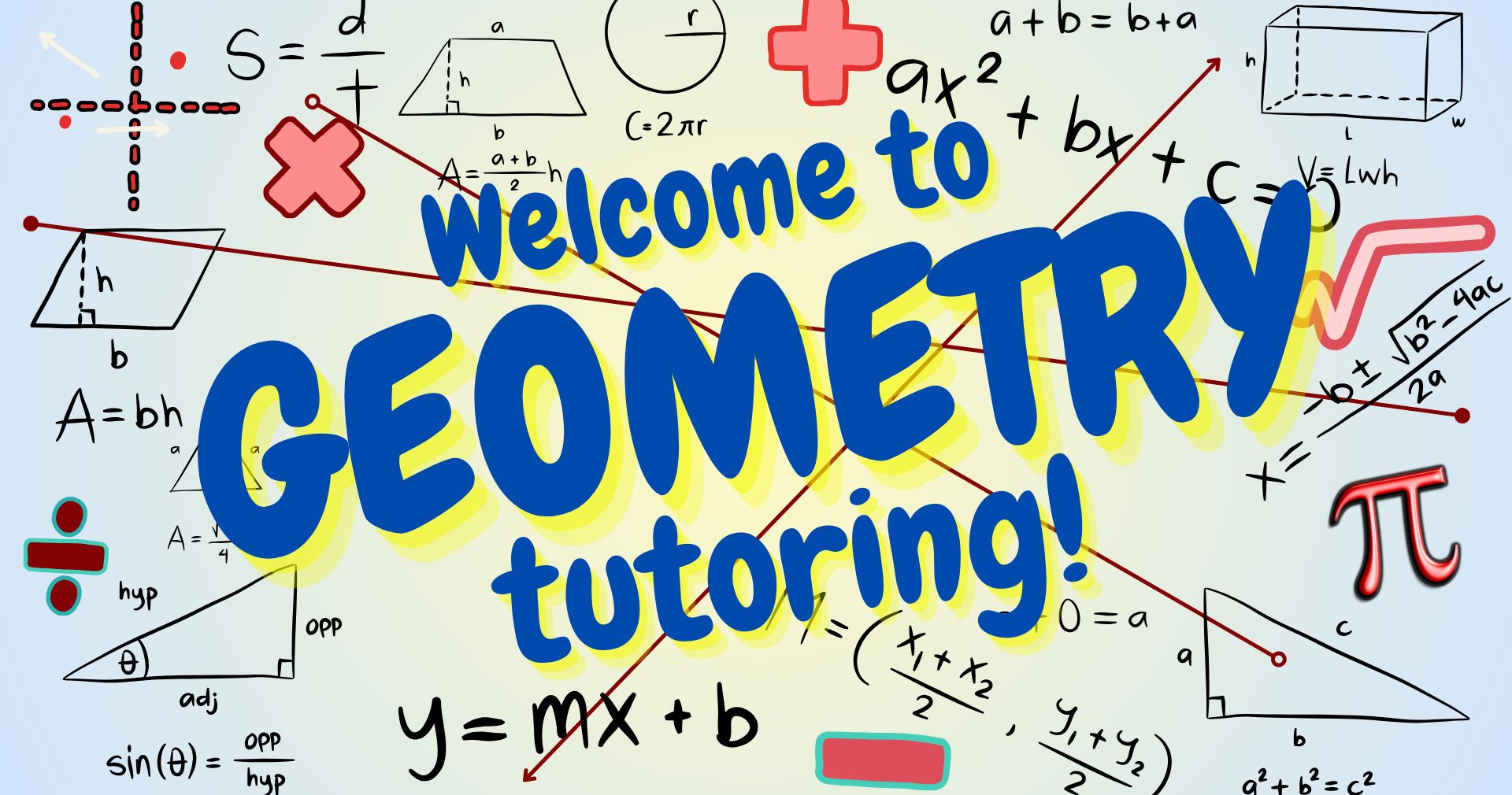Geometry Tutoring: A Tailored Method to Grasping Principles and Improving Qualities
Geometry tutoring supplies a special opportunity for students to boost their understanding of mathematical principles. With a concentrate on tailored direction, tutors can address details challenges and adjust to individual understanding styles. This targeted technique not only clears up complex subjects yet additionally cultivates self-confidence in pupils. As learners browse the subtleties of geometric concepts, they might discover unforeseen advantages that extend past the classroom. What might these benefits be?
Recognizing the Significance of Personalized Geometry Tutoring
Several trainees struggle with geometry due to its abstract principles, personalized tutoring can greatly boost their understanding and confidence. This customized approach allows tutors to customize lessons to meet each student's unique understanding style, pace, and details difficulties (Geometry Tutoring). By concentrating on locations where pupils might have difficulty, tutors can supply targeted explanations and practice, ensuring that fundamental concepts are solidified before progressing to more intricate topics
Furthermore, personalized tutoring fosters a supportive atmosphere where students feel comfy expressing and asking inquiries confusion. This motivation can greatly reduce anxiousness, allowing learners to involve even more totally with the material. Therefore, students commonly experience an increase in motivation and self-efficacy. Furthermore, tailored tutoring can aid connect the space between class instruction and individual comprehension, inevitably bring about improved performance in geometry. On the whole, the significance of tailored geometry tutoring hinges on its capability to satisfy individual demands and advertise scholastic growth.
Trick Ideas Covered in Geometry Tutoring Sessions
Geometry tutoring sessions encompass a range of crucial ideas that create the foundation of the topic. Key topics consist of the research of factors, lines, angles, and different geometric forms, such as circles, quadrangles, and triangulars. Tutors concentrate on properties and theses connected to these forms, including harmony, similarity, and the Pythagorean theorem.
Another important location of emphasis is the understanding of measurement, consisting of volume, border, and location computations. Additionally, tutors introduce trainees to coordinate geometry, where they learn to analyze the connections in between geometric figures and algebraic equations.
Changes such as representations, translations, and turnings are also substantial subjects, as they help trainees envision changes fit and position. Ultimately, coaching sessions usually cover the concepts of geometric proofs, fostering logical reasoning and essential reasoning skills essential for grasping the topic. Collectively, these concepts offer a considerable framework for recognizing geometry.
Advantages of One-on-One Tutoring for Geometry Proficiency
While numerous pupils benefit from group learning environments, individually tutoring provides tailored instruction that greatly boosts geometry mastery. This tailored strategy enables tutors to deal with each trainee's distinct discovering design and rate, making certain that concepts are completely comprehended. Customized attention enables students to ask questions openly, fostering a deeper comprehension of complicated geometric concepts.
One-on-one tutoring supplies prompt comments, permitting trainees to deal with mistakes and solidify their understanding in real-time. This instant clarification can substantially lower frustration and anxiety typically related to tough topics like geometry.
Additionally, the concentrated setting minimizes disturbances, enabling trainees to concentrate fully on their knowing goals. As a result, individually tutoring not only increases academic efficiency but likewise assists develop confidence in mathematical capabilities. Eventually, this personalized assistance can result in enhanced grades and an extra extensive appreciation of geometry as a topic.
How to Choose the Right Geometry Tutor
Exactly how can a trainee choose the most appropriate geometry tutor? It is necessary to analyze the tutor's credentials and experience in teaching geometry. A solid background in mathematics education and learning or a related area can suggest efficiency. Next, students should take into consideration the tutor's teaching style and whether it lines up with their knowing choices. Some students love a structured technique, while others might take advantage of a more flexible, appealing method.
Furthermore, examining reviews or testimonials from previous students can give insights right into the tutor's effectiveness and rapport. Availability and place are likewise significant elements; discovering a tutor that can suit the student's routine improves the possibility of regular sessions. Ultimately, a trial session can aid identify compatibility. This initial conference allows pupils to evaluate the tutor's communication skills and capability to discuss intricate concepts plainly, ultimately resulting in an extra enlightened decision.
Methods for Effective Geometry Knowing
Reliable geometry learning frequently includes visual understanding techniques, which help trainees realize complex principles via layouts and models. In addition, regular practice and application of geometric concepts reinforce understanding and retention. By incorporating these approaches, learners can boost their abilities and self-confidence in geometry.

Aesthetic Learning Techniques
Visual knowing strategies function as powerful tools for students going across the detailed globe of geometry. These approaches typically involve the usage of layouts, versions, and visual aids that enable learners to grasp complex concepts extra without effort. For example, geometric forms can be illustrated through illustrations or electronic depictions, allowing students to visualize relationships and residential or commercial properties. Additionally, color-coding various aspects within a representation can boost comprehension and retention. Mind mapping is one more reliable method, assisting trainees organize their ideas and see links between numerous geometric principles. By integrating aesthetic discovering techniques, students can promote a much deeper understanding of geometry, making abstract ideas much more concrete and easier to control. Eventually, these methods assist in an even more efficient and interesting knowing experience.
Technique and Application
A strong understanding of geometry calls for regular method and application of principles discovered. Engaging in regular problem-solving exercises enhances trainees' capacity to visualize and control geometric figures. Tutors advise including a selection of issues, from basic forms to extra complex proofs, to solidify understanding. Additionally, pupils need to use geometry principles to real-world scenarios, such as design or design, to see their relevance and energy. Utilizing on the internet sources, such as interactive geometry software program, can even more improve the understanding experience. Normal responses from tutors can determine locations that need enhancement, enabling targeted practice. Inevitably, a structured strategy incorporating varied methods and consistent application fosters mastery and enhances total academic performance in geometry.
Real-Life Applications of Geometry Abilities
Geometry skills play an important duty in numerous real-life applications, specifically in areas such as architecture and style, where spatial thinking is necessary for developing useful structures. Furthermore, engineering and modern technology greatly depend on geometric concepts to fix complicated issues and innovate new solutions - Online Geometry Help. Comprehending these applications can boost appreciation for geometry beyond the classroom
Style and Style

Design and Technology

Frequently Asked Concerns
Just How Much Does Geometry Tutoring Normally Price?
Geometry tutoring normally costs in between $25 and $80 per hour, relying on elements such as the tutor's experience, place, and whether the sessions are conducted in-person or on the internet, affecting general pricing and access for pupils. - Geometry Tutor
What Qualifications Should I Seek in a Tutor?
One ought to seek a tutor with a strong mathematics background, appropriate teaching experience, and knowledge with various finding out designs. Furthermore, qualifications or levels in education and learning or mathematics can enhance their trustworthiness and effectiveness in tutoring.
How Much Time Do Tutoring Procedure Usually Last?
Coaching sessions normally last in between one to 2 hours, permitting enough time for comprehensive explanation and method. The period may differ based upon the trainee's requirements, subject intricacy, and tutor's mentor style.
Can Tutoring Accommodate Different Learning Styles?
Yes, tutoring can suit various understanding designs by employing various teaching methods customized to private needs. This customized method improves understanding, retention, and application of concepts, ultimately fostering a much more efficient knowing environment for every trainee.
What Materials Are Required for Geometry Tutoring Procedure?
Vital materials for geometry tutoring sessions usually consist of chart paper, leaders, protractors, handouts, books, and calculators. Additionally, aesthetic aids like designs or layouts can boost understanding, accommodating numerous learning designs efficiently.
Geometry tutoring provides an unique chance for trainees to improve their understanding of mathematical ideas. Numerous trainees struggle with geometry due to its abstract principles, customized tutoring can significantly enhance their understanding and confidence. While numerous trainees profit from team knowing environments, one-on-one tutoring supplies customized instruction that greatly improves geometry mastery. Just how can a student select the most appropriate geometry tutor? Reliable geometry discovering pop over to this site typically includes visual understanding strategies, which help trainees realize complex principles via versions and representations.